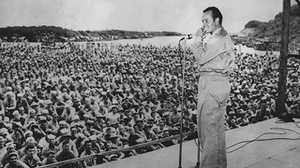How to End a War?
From the Collections: The Presidents | Leadership in times of crisisSurge of Troops in Iraq
To sell the military surge in Iraq to the American public, President Bush had been forced to take a rare step — admit his mistakes. "The surge of troops in Iraq was one of the most gut-wrenching policy decisions,” recalled communications director Dan Bartlett. “Everybody and everything suggested that pulling out was going to be the most important thing, and we did just the opposite."
From the film: George W. Bush
Ending the Cold War
Reagan "had this overriding conviction that a strong military face presented by the United States for a year or two would bring the hostile system to its knees," said official biographer Edmund Morris. But President Reagan needed to make concessions in order to reduce the nuclear threat.
From the film: Reagan
Carpet Bombing
Nixon decided to use force to end the Vietnam War, and refused to explain the 12-day "Christmas Bombing" to the American people. "He thought it was diplomatically vital that he make this look as cold an operation as possible," says speechwriter Ray Price.
From the film: Nixon
The Camp David Accords
President Carter's attempt at resolving the dispute between Israel and Egypt almost ended in failure. Egyptian President Sadat threatened to leave the talks at Camp David, but Carter used a personal approach to keep the talks going between Sadat and Israeli Prime Minister Begin.
From the film: Jimmy Carter
Atomic Bombs
When the Enola Gay dropped an atomic bomb on Hiroshima, Truman understood the repercussions. "This places a terrible responsibility upon myself and upon the War Department," he said.







